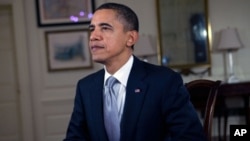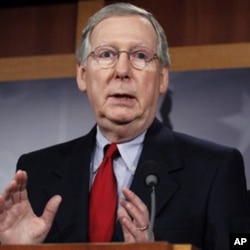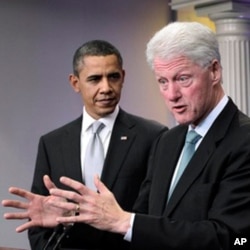Compromise and bipartisanship seem to be the favored words of the week in Washington, where U.S. politics seems to be veering toward the middle of the political spectrum, at least for the moment. The shift comes just weeks after opposition Republicans strengthened their hand in mid-term congressional elections, presenting President Barack Obama with a major political challenge for the next two years.
President Obama called Democratic losses in last month's elections a shellacking, and it appears that the president is heeding the advice from some within his own political party to move to the center and find common ground with Republicans.
That common ground took the form of a compromise over extending tax cuts for all Americans first approved under the administration of President George W. Bush.
"And this proves that both parties can, in fact, work together to grow our economy and look out for the American people," said Obama.
As the compromise makes its way through Congress, the president is getting some rare kudos from Republicans, including Senate Republican leader Mitch McConnell.
"We are telling the American people to keep money that is rightfully theirs so they can spend it and invest it as they please," he said. "This is an important shift and the White House should be applauded for agreeing to it."
But some of those not applauding are stalwart liberals in Obama's own Democratic Party who oppose extending tax cuts for the wealthy.
Among those trying to convince them that compromise is a good idea is former President Bill Clinton, who recently met with the president at the White House.
"I think the one thing that always happens when you have divided government is that people no longer see principled compromise as weakness," said Clinton. "This system was set up to promote principled compromise."
Some experts wonder if the president has done lasting damage to his relations with key liberal supporters who helped him get elected two years ago.
Faiz Shakir of the liberal Center for American Progress in Washington says many Democrats are convinced that Republicans are more interested in denying President Obama a second term than in helping him govern.
"The Republican Party sees that anything that President Obama does and gets done accrues to his benefit and that they, the Republican Party, have to stop that from happening," he said.
Shakir appeared on VOA's Encounter program with political expert John Fortier of the conservative American Enterprise Institute.
"There is not much of a middle left in American politics. Both sides are pretty polarized after this election. The president is not a wildly unpopular president, he is only mildly unpopular," he added. "But it took a good beating, a shellacking as he called it, at the polls and is now looking ahead to his re-election."
Predictably, both parties took something different from the November-election results. Republicans saw a repudiation of the Obama agenda and many newly-elected members want to focus on cutting the size of government during the next two years.
Democrats, including the president, heard another message entirely, says veteran political expert Tom DeFrank of the New York Daily News.
"He [Obama] said that the American people now expect us to work together," he said. "We have got to get something done. And if we do not get something done, we are all going to be held to account in 2012. He is trying to appeal to the millions of independents who helped elect him two years ago and who abandoned him by the tens of millions in this last November election."
Some of those same political independents are frustrated with the status quo of American politics and they met in New York this week to launch a movement aimed at ending the hyper-partisanship in Washington.
The group is called "No Labels", as in no more political labels like liberal and conservative, and seeks to find common ground among Democrats, Republicans and independents.
Newark, New Jersey Mayor Cory Booker is among those supporting the "No Labels" movement.
"We, right now, are not hanging together around our common principles and our common ideals and there is nothing more toxic to the soul of a nation when the lines of divide begin to trump the ties that bind," said Booker.
Many analysts question how long any mood of bipartisanship will last in Washington.
Political expert Norman Ornstein says the political divide remains deep, despite the recent tax compromise.
"Independents and Democrats, by almost two to one, say, 'Work together and compromise.' Republicans by nearly two to one say, 'Stick to principle even if it means nothing gets done.' Now how we work our way through that remains to be seen," he said.
That process begins in early January when the new Congress is seated and Republicans take control of the House of Representatives, while Democrats maintain a majority in the Senate.






